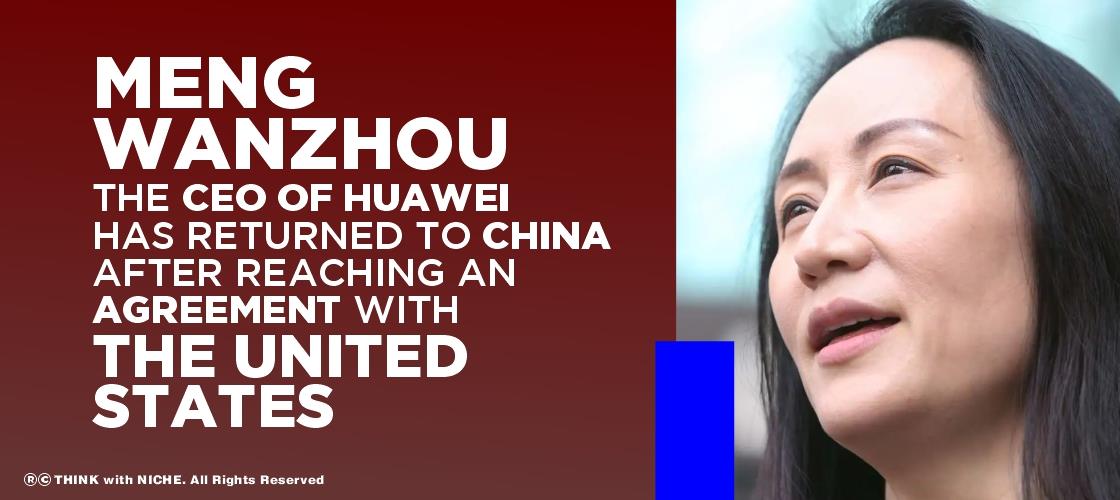Meng Wanzhou the CEO of Huawei has returned to China after reaching an agreement with the United States

News Synopsis
Latest Updated on 17 February 2023
In discussions with the United States last year, China's top focus, according to Foreign Vice-Minister Xie Feng, was the release of Huawei Executive Meng Wanzhou.
Presidents Joe Biden and Xi Jinping discussed Meng's situation during their discussions, according to Xie, who spoke to official television CCTV.
Meng was arrested in Canada in December 2018 at the US's request after it requested her deportation on allegations of fraud in connection with US sanctions against Iran. After reaching a deal with the US government, the extradition request was withdrawn, and she was released in September of last year.
Meng Wanzhou's release was the top priority for China in some specific cases, according to Xie, who spoke to the BBC on Thursday. China has previously claimed that this was one of its requests during the talks in Tianjin in July of last year.
At the meetings in Tianjin with Wendy Sherman, the US deputy secretary of state, China issued two lists, one outlining its main concerns and the other listing particular instances of "Wrongdoing" it intended the US to correct; both lists included Meng's case, the expert continued.
The particular requests included the removal of visa restrictions on Communist Party Members and their families, the removal of sanctions against Chinese officials and government organizations, and the removal of student visa limitations.
In particular, China requested that the US withdraw its request for Meng's extradition and stop classifying Chinese media outlets as "Foreign Agents."
Among its more general concerns were the treatment of Chinese Diplomatic Missions, attacks on or systematic oppression of its nationals, and growing anti-Asian and anti-China attitudes.
The US government accused Meng, the daughter of Huawei's Founder Ren Zhengfei, of breaking US sanctions by using a Huawei subsidiary, Skycom, to conduct business in Iran. In August 2018, a New York judge issued a warrant for her arrest.
On December 1 of the same year, she was arrested in Vancouver when she changed aircraft at the request of US officials.
The US Department of Justice submitted a formal extradition request to the Canadian authorities in January 2019 after presenting 13 criminal charges against Huawei, Meng, and its affiliates in the US and Hong Kong.
As part of a deferred prosecution agreement that effectively ended in charges being dropped, she was released in September 2021 after submitting a "statement of facts" with the US court, which said that she "knowingly supplied false statements" to HSBC regarding Huawei's contacts with Iran.
Xie spoke to CCTV Before a Canadian court's decision on the extradition request, Xi spoke with Biden.
"[Xi] again spoke to US President Joe Biden, asking for a proper solution, at the crucial point last year when the Canadian court was due to give the judgment in the Meng Wanzhou case," Xie stated.
Meng was ultimately freed and returned to China without admitting guilt or paying a fine.
Soon after Meng returned home to Canada, Michael Spavor and Michael Kovrig, two Canadian men who had been imprisoned in China days before her arrest and had been found to be guilty of spying, were freed.
Last Updated on 14 October 2021
Huawei CFO Meng Wanzhou and the US Department of Justice reached a deal on Friday to postpone prosecution of US accusations against her until late 2022, after which the allegations may be dismissed. Meng Wanzhou, a senior Huawei executive, returned to China after reaching an agreement with US prosecutors in an extradition case that has fuelled tensions between the West and Beijing for over three years. Meng was detained at the Vancouver airport in December 2018 at the request of the US authorities. She has been placed under house arrest at her multimillion-dollar city mansions while efforts to extradite her to face prosecution in the United States progress through Canadian courts.
The United States Justice Department agreed to let Huawei Technologies Co. finance chief Meng Wanzhou return to her home in China nearly three years after she was arrested in Canada on behalf of the United States, removing one issue in the United States worsening ties with China.
Under the terms of the deal, Ms. Meng confessed to some misconduct remotely from Canada in exchange for prosecutors delaying and ultimately dismissing wire and bank fraud charges. However, as part of the arrangement, Meng confessed that the facts stated in the deferred prosecution agreement are correct. According to prosecution filings, one of these facts is that she misrepresented Huawei's relationship with Skycom to HSBC. If she says or suggests differently, she may break the conditions of the agreement and face punishment.









